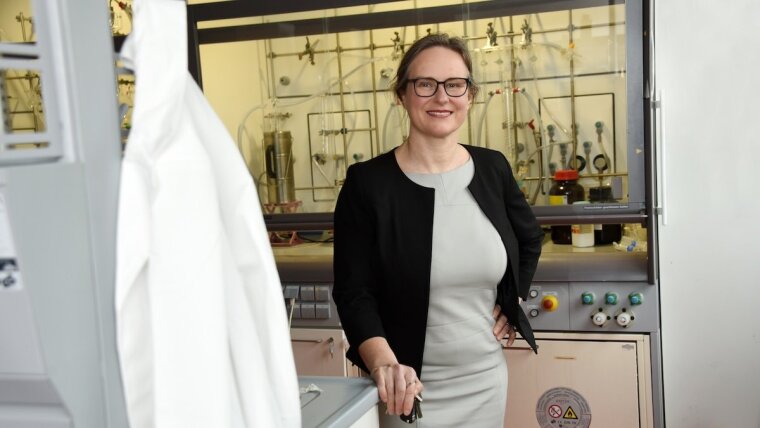
- Awards and Personnel
- Research
- Studies and Teaching
Published: | By: Marco Körner
After two decades of research and teaching in Munich and Bayreuth, chemist Birgit Weber has returned to the place where her scientific career began. “It feels like coming home to a community that is both familiar and inspiringly new,” describes Weber the feeling of being back. “Jena has remarkably developed, yet the essential scientific curiosity at this location has remained,” she says about the science hub from today’s perspective.
Iron as Favourite Element
In her research, Weber focuses on so-called 3d metals, i.e., the lightest transition elements in the periodic table. These elements are commonly found in nature, are affordable, and comparatively environmentally friendly. “My favourite element is iron,” says the chemist, “because the coordination chemistry of iron offers diverse and sustainable application possibilities – from smart contrast agents to efficient photocatalysts for hydrogen production.” To this end, she utilises various properties of these compounds: “The magnetic properties of such iron complexes can be very effectively influenced, for example, by changing the temperature,” she explains. “This allows these compounds to be used in sensor technology.”
Some iron complexes also have another useful property: luminescence. “This phenomenon is known, for example, from phosphorescent dyes that emit previously absorbed light energy with a delay as light,” the chemist elaborates. This stored energy can also be transferred to a suitable catalyst, which then, for example, generates hydrogen from water.
Research and Teaching in Combination
In teaching, it is important to her not only to impart knowledge but also to inspire students to conduct independent research. “The link between research and teaching is essential to train the next generation of scientists,” she emphasizes. Her teaching philosophy aims to make complex content understandable and tangible, with a special focus on the practical application of what has been learned.
After receiving her doctorate in Jena, Weber moved to LMU Munich in 2003, where she established her own research group with the help of a Liebig Fellowship from the Fund of the Chemical Industry. In 2009, she qualified as a professor and in 2010 moved to the University of Bayreuth. Finally, in 2023, she took up a professorship at the university where her scientific career began: “I never thought I would come back to Jena. I hadn’t reckoned with that at all. But it’s great to be back.”
More Space, More Say, More Creative Opportunities
The better conditions and the excellent environment lured her back to Jena: “There’s much more space in the laboratories and measurement rooms here. And I now also have a permanent staff position for a very good postdoc who has been with me for a long time,” Weber is pleased to report. As some of her colleagues at the institute are nearing retirement, Weber’s professorship also includes the task of reorienting the Institute of Inorganic and Analytical Chemistry. Thus, the creative possibilities and the research environment ultimately convinced Birgit Weber. “The entire research on polymers, on composites, working with light – it was a clear decision,” she states. “I’ve always said: If Jena wants me, I’ll go.”